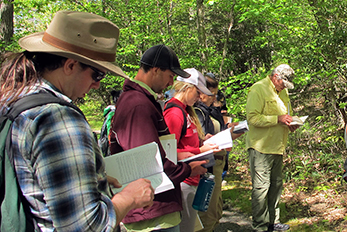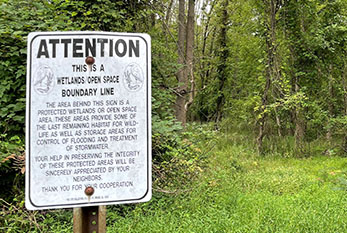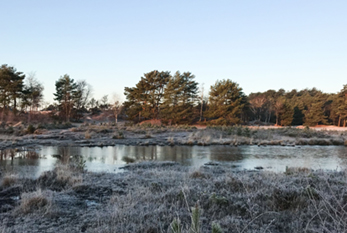Main Content
Learn how to identify wetland plants in the Southern NJ region and distinguish between upland and wetland plant species – an essential step in the wetland delineation process.
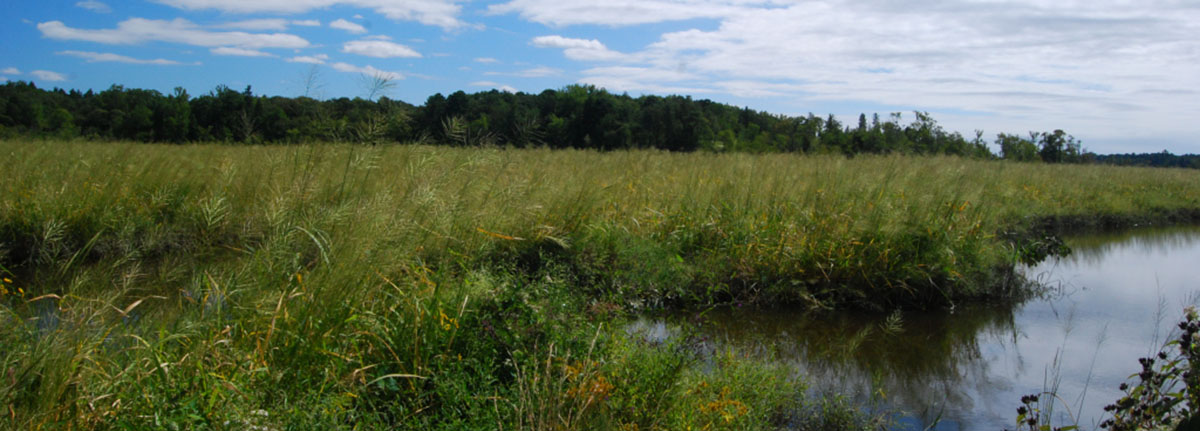
Course Status Notice – Not Scheduled
We do not have an offering of this course scheduled at this time. Please join our email list to be notified when the next offering is scheduled!
Jump to: Overview | Instructor | Reviews | CE Credits | Contact Us | Related Courses | Join Email List
Course Details
Course Name: Vegetation Identification for Wetland Delineation: South
Course Code: EH0502WA26
Date of Most Recent Offering: August 20 & 21, 2025
Course Overview
![]() This class is part of the Wetland Delineation Certificate Program.
This class is part of the Wetland Delineation Certificate Program.
Wetland plants, also known as hydrophytes or hydrophytic vegetation, have adaptations that enable them to grow and reproduce with their roots in water or saturated soil for at least part of the year. In contrast, plants that cannot survive in saturated conditions are commonly referred to as upland plants.
Along with hydric soils and hydrology, the presence of wetland plants is one of the primary factors involved in the identification of wetland areas and the delineation of wetland boundaries. Therefore, the ability to identify wetland plants and distinguish between upland and wetland plant species is an essential step in the wetland delineation process.
Through instructor-led online lectures and virtual tours of various wetland sites, you will learn plant identification principles and study diagnostic characteristics of species frequently encountered by wetland delineators in the Southern New Jersey region. By the end of the course, you will be able to quickly and confidently identify the wetland plant species that are important in determining if an area meets the hydrophytic vegetation criterion for wetland delineation.
NOTE: If you are planning to earn the Wetland Delineation Certificate, we require that you complete the Vegetation Identification and Hydric Soils courses prior to attending Methodology for Delineating Wetlands.
Course Objectives
- To provide a review of wetland plant communities of South Jersey, emphasizing their dominant species.
- To familiarize students with important diagnostic features used to separate plants into groups for field identification.
- To use field guides to identify plants characteristic of freshwater wetlands in South Jersey.
- To introduce students to some rare and uncommon plants found in wetlands of the New Jersey Pine Barrens.
Course Completion Requirements
The following requirements must be met to earn a certificate of completion for this wetland vegetation identification course:
- Active participation during the course
- Pass a quiz at the end of the class
- Complete a digital herbarium project independently after the course concludes and within the timeframe allotted (typically 3-4 weeks)
Who Should Attend?
This wetland vegetation identification course is designed for anyone who wants to gain experience identifying wetland plants. Past participants have included:
- Arborists and Forestry Technicians
- Biologists
- Ecologists
- Engineers
- Environmental Scientists and Consultants
- Geologists and Hydrogeologists
- GIS Specialists
- Landscape Architects and Landscape Designers
- Land Surveyors
- Land Use Professionals
- Natural Resources Specialists
- Park Naturalists
- Planners
- Registered Environmental Health Specialists (REHS)
- Wetlands Specialists and Wetland Scientists
- Wildlife Field Technicians
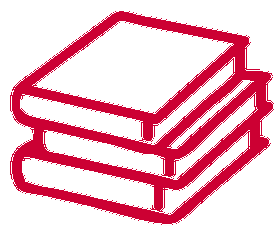 Required Textbooks
Required Textbooks
There are two required textbooks for this course. You may purchase these books on your own or through our office with your registration.
- Newcomb’s Wildflower Guide [ISBN 0316604429] by Lawrence Newcomb – $28
- Field Guide to Tidal Wetland Plants of the Northeastern U.S. and Neighboring Canada [ISBN 9781558496675] by Ralph W. Tiner – $45
Meet Your Instructor
Ralph Tiner, M.S., M.P.A., SWS Fellow

Ralph Tiner has more than 40 years of practical experience in wetland delineation and is a nationally recognized authority in the field. He recently retired from the U.S. Fish & Wildlife Service where he directed wetland mapping in the Northeast United States as part of the U.S. Fish & Wildlife Service’s National Wetlands Inventory (NWI). He is a nationally recognized expert on wetland delineation and has been actively involved in improving wetland delineation techniques for decades. In addition, he was compiler and principal author of the Federal Interagency Wetland Delineation Manual, which was published in 1989 and is the standard for identifying and delineating wetlands in New Jersey.
Read More About Ralph Tiner
Ralph has written extensively on the subject of wetlands and is the author of several field guides including: Field Guide to Non-tidal Wetland Identification, Maine Wetlands and Their Boundaries, A Field Guide to Coastal Wetland Plants of the Northeastern United States, and In Search of Swampland, as well as an update of the Wetland Indicators book entitled Wetland Indicators: A Guide to Wetland Formation, Identification, Delineation, Classification, and Mapping. His most recent books are: Tidal Wetlands Primer: An Introduction to Their Ecology, Natural History, Status, and Conservation and Remote Sensing of Wetlands: Applications and Advances (for which he is senior editor and authored several chapters).
In addition to writing about wetlands, he has been teaching wetland identification and delineation courses through the Rutgers Office of Continuing Professional Education Office since the mid-1980s.
Student Reviews
Most useful aspect of the course: “I became more comfortable using keys for plants, as well as identifying species that are common in different aquatic/estuary ecosystems. This will definitely be useful in identifying flora and their relationship with fishes and other organisms in coastal research.”
– Iphigenia “Jen” Arvanitis
“Prior to this course, I rarely ever used a dichotomous key for plant identification. Ralph has revived my understanding and proficiency in using dichotomous keys, which has allowed me to properly identify wetland plants. I now carry my field book everywhere in the event I run into a plant that I am unfamiliar with to test out these new skills!”
– Ivy Babson, Princeton Hydro, LLC
“Having the opportunity to take a wetland plant ID course by Ralph Tiner is immeasurable. The online option was perfect, and I loved the field homework assignment. Thank you!”
– Past Participant
Continuing Education Credits
The most recent offering of Vegetation Identification for Wetland Delineation: South was approved for 1.5 Rutgers CEUs (15 contact hours), as well as the following credits from professional organizations. We will reapply for similar credits the next time the course runs, but we cannot guarantee credit approval for future offerings.
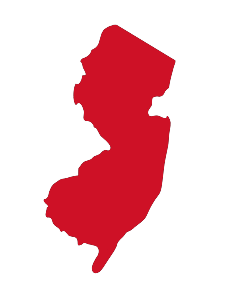 New Jersey
New Jersey
NJ Certified Public Works Managers (CPWM): 3 Technical and 3 Management Contact Hours
NJ Health Officers and Registered Environmental Health Specialists (HO/REHS): Rutgers University, NJAES, Office of Continuing Professional Education has been approved by the New Jersey Department of Health as a provider of NJ Public Health Continuing Education Contact Hours (CEs). Participants who complete this education program will be awarded 13.0 NJ Public Health Continuing Education Contact Hours (CEs).
NJ Land Surveyors (NJLS): 12 PDHs
NJ Licensed Site Remediation Professionals (LSRP): 6 Professional Development CECs (Course No. 2024-052)
NJ Professional Engineers: 12 Continuing Professional Competency (CPC) credits
 New York
New York
NY Landscape Architects: 1 hr CL; 13 hrs EA
NY Professional Engineers: 12 hours
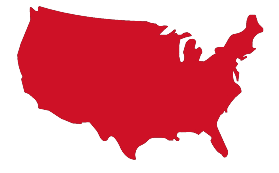 National
National
Society of American Foresters: 12.5 CFEs in Category 1
Society of Wetland Scientists Professional Certification Program (SWSPCP): 1.0 equivalent semester hours
Attention U.S. Veterans
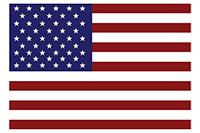
This course is approved by the New Jersey State Approving Agency for Veterans Training for educational benefits through the GI Bill®. Learn more.
GI Bill® is a registered trademark of the U.S. Department of Veterans Affairs (VA). More information about education benefits offered by VA is available at the official U.S. government website at http://www.benefits.va.gov/gibill.
Program Questions? We’re Here to Help!
If you have any questions about Vegetation Identification for Wetland Delineation: South, please don’t hesitate to reach out to us.

Senior Program Coordinator: Suzanne Hills
848-932-7234
suzanne.hills@rutgers.edu

Administrative Assistant: Amy Smith
848-932-7764
amy.smith70@rutgers.edu
For registration assistance, please contact our Registration Department at 848-932-9271, option 2 or email registration@njaes.rutgers.edu.
